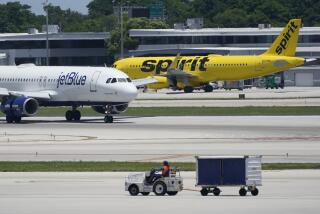Continental Airlines won’t seek merger, CEO says
Continental Airlines Inc. said Sunday that it would not pursue a combination with another carrier right away, a surprising move after weeks of growing speculation that it would join with United Airlines to create the world’s biggest airline.
Continental Chairman and Chief Executive Lawrence Kellner said in a message to employees that the Houston-based airline was better off alone than merging.
“We have significant cultural, operational and financial strengths compared to the rest of the industry, and we want to protect and enhance those strengths -- which we believe would be placed at risk in a merger with another carrier in today’s environment,” Kellner told employees.
Although it reported an $80-million loss in the first quarter, Continental is widely viewed as the second-strongest U.S. carrier in financial terms, behind only Southwest Airlines Co., which has indicated that it isn’t interested in a merger.
Although Kellner ruled out a merger for the time being, Continental appeared to leave the door open to an alliance with another carrier. The airline has reportedly discussed such an arrangement with AMR Corp., the parent of American Airlines, in which the companies would work together in many ways but not merge their operations.
Airlines have been considering consolidation as a way to cut costs and raise fares in the face of record fuel prices. Delta Air Lines Inc. announced this month that it had agreed to buy Northwest Airlines Corp. in a stock-swap deal that would create the world’s largest carrier. A Continental-United combination would have trumped Delta-Northwest in size.
“Every U.S. carrier, including Continental, is under enormous pressure from record high fuel prices, a slowing U.S. economy and a weak dollar,” Kellner told employees. “In today’s harsh environment, we must continue to adjust our business model to ensure we successfully navigate through these difficult times, so that in the future we can once again grow and prosper.”
Continental expects to spend $1.2 billion more on fuel this year than it did in 2007. To cope with the added cost, the airline plans to take some older, less-fuel-efficient planes out of service over the next 12 months and to reduce its U.S. capacity by 5% beginning this fall.
Ray Neidl, an analyst with Calyon Securities, said Continental’s exit left US Airways Group Inc. as a potential merger partner for United.
The CEOs of United and US Airways are both proponents of airline mergers. But US Airways lacks the strong international routes that made Continental an attractive partner.
A US Airways spokesman declined to comment, and a United spokesman did not return a call for comment.
A spokesman for Continental’s union pilots said they were pleased that the company wouldn’t pursue a merger, given the weak condition of other carriers. United Airlines parent UAL Corp., for example, lost $537 million in the first quarter and announced it would cut 1,100 jobs.
“We are somewhat relieved,” said the union spokesman, Mark Adams. “We look around at the first-quarter financials from the other legacy carriers. Do you really want to swim out to a drowning man and just get pulled down with them?”
Kellner had long said Continental would prefer to remain independent -- if the landscape of the airline industry stayed the same.
But Kellner opened the door to merger speculation this month by saying that the Delta deal had changed the landscape, and by exercising a right to buy out Northwest’s veto power over a Continental merger -- although that move cost only $100 once Northwest agreed to be bought by Delta.
Continental and its regional subsidiaries operate about 3,100 daily flights. Continental has major hubs in Newark, N.J., Houston and Cleveland.






